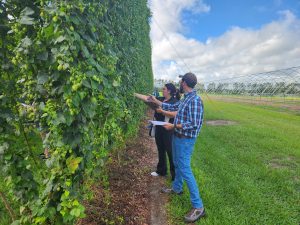Many craft brewers prefer to make their product using hops pellets because of several advantages they provide over whole cone hops. To address a request by Tampa Bay-area craft brewers, University of Florida scientists are converting the crop they grow into pellets.
“Brewers use several forms of hops to make beer, including pellets, fresh whole cones, dried whole cones and oil extracts,” said Shinsuke Agehara, a UF/IFAS associate professor of horticultural sciences. “Each of them offers distinct advantages and is suited to different brewing processes. However, pellets provide practical advantages in terms of storage, consistency, ease of use, waste reduction and cost-effectiveness, making them the preferred choice for many brewers.”

Researchers at the UF/IFAS Gulf Coast Research and Education Center (GCREC) recently received a hammer mill and a pelletizer from Brian Nelson at Sunshine State Hops. A hammer mill grinds whole cone hops to powder, and a pelletizer takes hops powder and converts it into pellets.
“It’s convenient for the brewers. Most brewers use hops in pellets, which are made of ground dried cones,” said Agehara, a faculty member at GCREC. “Compared to whole cone hops, pellets contain less vegetative tissues, so they absorb less water during brewing, thus reducing beer losses.”
Pellets break down quickly in water, so acids and oils can be more efficiently extracted acids and oils, which give craft beer its bitterness and aroma, Agehara said. The pellets also have a longer shelf life than whole, dried cones and they can save shipping fees and storage space because they’re more compact.
Agehara shared this update, among other new research at the Spring Hops Field Day on June 5 at the GCREC.
For example, Florida now has 404 craft breweries, spread throughout the state, up from 45 in 2011. That increase compels Agehara and Zhanao Deng to study the best ways to grow hops in Florida’s hot, humid climate.
The hops grown at GCREC are the result of about eight years of experiments. In that time, Agehara and Deng, a UF/IFAS professor of environmental horticulture, have used LED lighting to trick the crop into thinking daylight lasts longer than it really does.
Using the LED lights, scientists at GCREC grow hops twice a year, and it means Florida hops has two growing seasons — unlike any other hop production regions around the United States, Agehara said.
Hops require about 15 hours of daylight before they flower. That’s why the crop generally grows better in the Pacific Northwest, where more than 90% of the nation’s hops are produced. At peak day-length in summer, Florida gets less than optimal daylight hours.
GCREC scientists gave encouraging news at the field day: Their record high yield for the variety ‘Cascade’ is about 1,600 pounds per acre, which is just about as much as the yield in the Pacific Northwest. This year’s hops are looking to surpass the record high yield.
“Our methods are proving to brewers and growers that we can grow a hardy hops crop in Florida,” Agehara said.
To contact Agehara about obtaining hops from GCREC, email him at sagehara@ufl.edu. Click here to see more on the GCREC Facebook page.
###
ABOUT UF/IFAS
The mission of the University of Florida Institute of Food and Agricultural Sciences (UF/IFAS) is to develop knowledge relevant to agricultural, human and natural resources and to make that knowledge available to sustain and enhance the quality of human life. With more than a dozen research facilities, 67 county Extension offices, and award-winning students and faculty in the UF College of Agricultural and Life Sciences, UF/IFAS brings science-based solutions to the state’s agricultural and natural resources industries, and all Florida residents.
WHY FOOD IS OUR MIDDLE NAME
Feeding a hungry world takes effort. Nearly everything we do comes back to food: from growing it and getting it to consumers, to conserving natural resources and supporting agricultural efforts. Explore all the reasons why at ifas.ufl.edu/food or follow #FoodIsOurMiddleName.
 0
0
